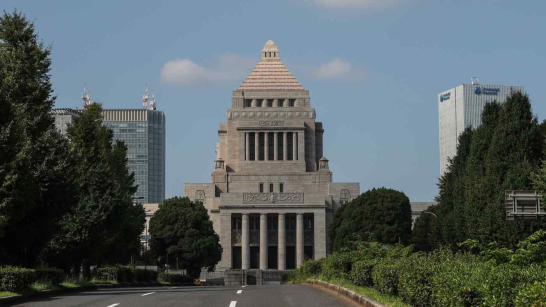
A bill offering support to victims of the Unification Church passed Japan's House of Representatives on Dec. 8. © Getty Images
TOKYO -- Lawmakers in Japan's House of Representatives voted Thursday to pass a new bill offering support to victims of the Family Federation for World Peace and Unification, widely known as the Unification Church. The bill is expected to be voted into law by the House of Councilors before the closing of the current Diet session on Dec. 10.
The new legislation, which passed with a majority of votes from both ruling and opposition parties, would ban organizations such as the church from soliciting donations through fear, and grant members the right to withdraw donations if they are found to have been made under coercion. Children and spouses of members will also gain the right to request the cancellation and partial refund of donations made by their relatives.
The vote comes amid an ongoing investigation into the Unification Church's activities, launched by the education ministry on Nov. 22. The probe was the first time the government has used its "right to question" a religious organization under Japan's Religious Corporations Law.
The church is required to submit its responses to the questions, which relate to issues such as the group's suspected mediation of a shady "adoption" system between members, by Dec. 9. If the church is found to have violated civil or criminal law, it could face dissolution, losing its "religious juridical persons" status and tax benefits.
The Unification Church's fundraising activities have been subject to scrutiny since the 1980s, when it was first accused of using "spiritual sales" to obtain vast sums of money from members. The Network of Lawyers Against Spiritual Sales estimates that the group amassed 123.7 billion yen ($873 million at the current exchange rate) in spiritual sales between 1987 and 2021.
Spiritual sales tactics commonly involve persuading believers to buy extortionately priced items, such as stone ornaments, in return for promises of spiritual salvation.
Speaking in the Diet on Tuesday, Prime Minister Fumio Kishida said that donations to the Unification Church are often "solicited by taking advantage of people's anxieties," and that members should be offered the option to withdraw payments in such cases.
The new legislation lays out several "duties of consideration" that organizations must comply with when gathering donations, such as not violating members' free will. But Kishida's ruling Liberal Democratic Party has faced criticism from opposition parties and church critics, who say that the measures are too weak.
At the sitting of the lower house on Thursday, Kotaro Ikehata from opposition party Nippon Ishin said his party welcomed the bill as "one step in the right direction," but noted, "the legislation has some insufficiencies."
An earlier version of the bill did not include penalties for groups found not to be fulfilling the legal requirements, but was amended on Monday due to pressure from the opposition Constitutional Democratic Party (CDP) and Nippon Ishin. Under the amended legislation, groups failing to comply will receive a government warning and be publicly named if they continue to violate the rules.
Critics say the bill will offer little relief to vulnerable members of the Unification Church. This bill "is a half-baked attempt to solve the issue of religious organizations in Japan," said Yoshifu Arita, a journalist and former upper house member for the CDP.
Arita and other opponents point to France's controversial 2001 anti-cult law as a model for a stricter crackdown on potentially dangerous religious groups. Commonly known as the About-Picard Law, the French legislation punishes groups or individuals found guilty of "fraudulent abuse" resulting from "the exercise of serious or repeated pressure or techniques likely to alter judgment" with up to five years in prison.
The law was introduced following a string of mass murders and suicides in France and other European countries in the mid-1990s, which were linked to the Order of the Solar Temple religious sect. France's crackdown was met with uproar from religious groups worldwide, who argued that the law infringed upon their right to religious freedom.
"The [Japanese] government's measures will not go as far as France's law," Arita told Nikkei Asia. "It is important to include the term 'mind control' in the legislation to bring real change for victims."
Addressing the Diet on Dec. 6, Kishida said the new bill would target individuals who make donations "under a state of mind control." But the phrase "mind control" is not included in the legislation, as it is deemed too difficult to define legally. The CDP and other opponents argue that the law will be difficult to enforce if victims cannot prove they made donations due to mind control.
Sayuri Ogawa (a pseudonym), a Unification Church defector whose parents are still members, told Nikkei that she felt the effects of "mind control" in her household growing up. "My parents believe that everything the church says is absolutely correct, and they would do anything [for the group]," she said.
In comments to Nikkei, the Unification Church said that the suggestion that donations are made under mind control is "a dangerous claim that deceives the public." The church added it has "serious concerns" that a law incorporating "mind control" would threaten the rights to freedom of religion and thought for "various organizations."
Ogawa and other victims have been publicly advocating for the dissolution of the church after the issue was brought to light by the murder of former Prime Minister Shinzo Abe in July. The suspected gunman is the son of a church member, who targeted Abe over his perceived links to the group.
Since Abe's death, a torrent of revelations about connections between the ruling LDP and the church have plunged Kishida's government into turmoil. A recent Nikkei poll shows the cabinet's approval rating had fallen to 37%, the lowest since Kishida took the top post last October. Seventy percent of respondents said they did not approve of the government's handling of the Unification Church scandal.





